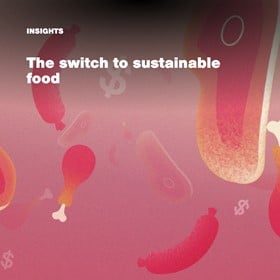Key points
This article is part of the Disruptive Innovation series.
- The public is increasingly turning away from physical money to transactions involving novel forms of payment technology including digital wallets and ‘pay later’ point-of-sale credit, among other disruptive innovations
- Companies enabling this change have the potential to increase their worth by using the data they gather to provide other financial services
- Payment service providers Adyen and Stripe are among those at the forefront in the west, while ecommerce giants Alibaba, Tencent and MercadoLibre have built substantial payments businesses in emerging markets

All investment strategies have the potential for profit and loss. Your or your clients’ capital may be at risk. Past performance is not a guide to future returns.
Cash appears to be on its way out. And credit cards may be going the same way.
In their place comes an increasingly complex world of digital wallets, online transactions and ‘buy now pay later’ services.
This transition could have posed overwhelming challenges to businesses. But some highly innovative, founder-led companies have stepped in.
These businesses are “the unsung heroes in the background of the innovation we have enjoyed in online commerce in recent years”, investment manager Gemma Barkhuizen said at a recent Baillie Gifford event exploring disruptive innovation across several industries.
As a result, she said, merchants can keep up to date with the growing number of payment options available.
Doing so can make the difference between securing or losing a sale. Being unable to accept Apple Pay or Google Pay at a shop counter or PayPal and AliPay at a website’s checkout page can cause customers to walk away.
Furthermore, some fintechs are also offering analytics and other new services that can benefit business customers and consumers alike.
“History shows that when you have a collision of technological change with a large market opportunity then you’re in fertile hunting ground for growth,” said Barkhuizen.
“And in the payment space we have various forms of that disruption in the context of a market that might be the largest I will see in my career.”
WATCH: Baillie Gifford webinar on digital payment platforms
Cash out
Spending on payment cards totalled $35tn in pre-pandemic 2019.
And physical money is in fast decline. In 2020, use of bank notes and coins at shop tills was down by about a third on the previous year, according to one study. The Covid pandemic altered how people spend, probably for good.
“That amounts to about half a decade of change packed into a single year,” said Barkhuizen.
Online sales, by contrast, are booming, and forecasts indicate they will account for a growing share of consumer spend for years to come.
That creates an opportunity for two innovative payment service providers in which Baillie Gifford has invested: Adyen and Stripe. They empower some of the internet’s biggest brands.
For example, when Netflix expanded into 130 countries at once in 2016, it was Adyen’s payment acceptance infrastructure that enabled the video-streamer to accept and manage subscriptions paid in local currencies via a wide range of different payment methods.
In general, the Dutch firm targets large enterprises with complex needs. Its other clients include Airbnb, Uber, McDonalds, eBay and Spotify.
Stripe is used by big names including Wayfair, Deliveroo, Amazon and Zoom but much of its focus is on providing a service to smaller start-ups.
One of its distinguishing features is the add-on services it provides.
For example, Shopify uses Stripe’s tech to offer merchants a way to pay bills, track expenses and monitor their cash flow.
“Stripe is shaping up to be a much broader platform that’s enabling companies of all kinds to experiment with forays into fintech,” said Barkhuizen.
“And in that sense, it starts to look analogous to Amazon’s cloud computing business AWS – but for fintech.”
WATCH: Baillie Gifford animation on disruptive innovation
Emerging markets
In China, the shift from cash to digital payments is even further along the path.
If you don’t use AliPay or WeChat Pay, you can find yourself being unable to buy food in many restaurants, let alone trying to order a takeaway via an app.
Alibaba and Tencent respectively developed the tools because China lacked a mature payments infrastructure at the time they were establishing their core businesses. In addition to supporting payments to merchants, both services allow peer-to-peer money transfers between members of the public among the many features they have added over time.
Their scale is now astonishing.
Last year, Alipay alone reported processing more than $18tn of payments over a 12-month period – that’s more than Visa and Mastercard’s annual global tally combined.
But China isn’t the only emerging market where a Baillie Gifford-backed ecommerce giant has developed a digital payments platform, and then carried on building.
Argentina’s MercadoLibre reported nearly $50bn of transactions going through its Mercado Pago service last year, much of this occurring beyond its own website.
In addition, the business has expanded into other financial services including insurance, merchant credit, consumer lending and asset management.
“In Brazil, one of its core markets, the incumbent banks have some of the most expensive lending rates in the world,” said Barkhuizen.
“So to disrupt that with a lending business that can be fairer is a massive opportunity.”
No late fees
The rise of ‘buy now pay later’ companies is a further disruptive force.
They still account for a relatively small proportion of all online purchases but are expected to bite a deep chunk out of the credit card business over the next few years.
Affirm, another Baillie Gifford-backed company, is one of the leaders in the field.
Many consumers don’t pay an interest charge on the loans it makes.
Instead, Affirm makes money by charging the vendor a commission. They pay it because it can make the difference in securing a sale.
For instance, in the case of its tie-up with connected fitness firm Peloton, customers don’t pay interest if they pay off the equipment in full within an agreed timespan of up to 43 months. Nor are they billed for late fees if any of their instalments are overdue.
Some charities have voiced concerns that such offers can tempt people into debt, raising the prospect of regulatory intervention.
But as a business model it is arguably fairer than alternative ways to defer payment.
“Late fees mean credit cards are incentivised to offer loans to consumers who struggle to service their debt because the cards profit off the fines,” said Barkhuizen.
“Affirm thinks that’s toxic.”
Programmable money
The traditional finance system still plays a role in the examples given above.
But there’s the prospect of further disruption if cryptocurrencies catch on.
They can enable transfers of value which completely sidestep traditional payment routes, whether that’s to buy a pizza or pay taxes.
The attraction is that some of the complexity and cost of current payment systems could be reduced, while making further new features possible.
“Money for the first time can be programmable,” Barkhuizen said.
“You might, for example, only be able to spend it on a specific thing at a specific place.”
“It’s inherently difficult to predict what this new possibility might enable in financial services, just as one couldn’t have predicted that the advent of smartphone technology would lead to something as ostensibly unrelated as disruption of the taxi market through Uber – but what we can be excited about is that this new capability should enable new innovation.”
Baillie Gifford has invested in a handful of companies attempting to develop new financial infrastructure by building financial services on top of the Bitcoin network. This helps further its understanding of the disruptive potential of cryptocurrencies.
The holdings include a stake in Blockstream, which is run by Adam Back. The esteemed cryptographer was one of a select few to have his work referenced in Satoshi Nakomoto’s Bitcoin white paper. This was the seminal document that laid the foundation of cryptocurrency technology.
“Blockstream has attracted some of the greatest minds in the Bitcoin space,” said Barkhuizen.
Physical money has been in use for thousands of years.
As long-term investors, the prospect of being involved in the shift to a new paradigm is hugely exciting, with plenty of upside potential for the companies leading the charge.
About the Investment Manager
Gemma Barkhuizen
Investment Manager
Gemma joined Baillie Gifford in September 2017. She is currently an analyst in the Long Term Global Growth Team and one of the managers of the Global Outliers strategy. She graduated MA in Modern History from The University of Durham in 2017. Prior to this, Gemma also graduated BA (Hons) in History and BA double major in History and Philosophy from Rhodes University in South Africa
Written by Leo Kelion
Assistant editor, Intellectual Capital
You can read our other articles on disruptive innovation via the links below.
Important Information and Risk Factors
The views expressed in this communication are those of the speaker(s) and should not be considered as advice or a recommendation to buy, sell or hold a particular investment. They reflect personal opinion and should not be taken as statements of fact nor should any reliance be placed on them when making investment decisions.
This communication was produced and approved in October 2021 and has not been updated subsequently. It represents views held at the time of writing and may not reflect current thinking.
Some Baillie Gifford portfolios have a significant exposure to private companies. These assets may be more difficult to buy or sell, so changes in their prices may be greater.
Any stock examples mentioned are not intended to represent recommendations to buy or sell, neither is it implied that they will prove profitable in the future. It is not known whether they will feature in any future portfolio produced by us. Any individual examples will represent only a small part of the overall portfolio and are inserted purely to help illustrate our investment style.
This communication contains information on investments which does not constitute independent research. Accordingly, it is not subject to the protections afforded to independent research, but is classified as advertising under Art 68 of the Financial Services Act (‘FinSA’) and Baillie Gifford and its staff may have dealt in the investments concerned.
All information is sourced from Baillie Gifford & Co and is current unless otherwise stated.
The images used in this communication are for illustrative purposes only.
Baillie Gifford & Co and Baillie Gifford & Co Limited are authorised and regulated by the Financial Conduct Authority (FCA). Baillie Gifford & Co Limited is an Authorised Corporate Director of OEICs.
Baillie Gifford Overseas Limited provides investment management and advisory services to non-UK Professional/Institutional clients only. Baillie Gifford Overseas Limited is wholly owned by Baillie Gifford & Co. Baillie Gifford & Co and Baillie Gifford Overseas Limited are authorised and regulated by the FCA in the UK.
Persons resident or domiciled outside the UK should consult with their professional advisers as to whether they require any governmental or other consents in order to enable them to invest, and with their tax advisers for advice relevant to their own particular circumstances.
Financial Intermediaries
This communication is suitable for use of financial intermediaries. Financial intermediaries are solely responsible for any further distribution and Baillie Gifford takes no responsibility for the reliance on this communication by any other person who did not receive this communication directly from Baillie Gifford.
Europe
Baillie Gifford Investment Management (Europe) Limited provides investment management and advisory services to European (excluding UK) clients. It was incorporated in Ireland in May 2018 and is authorised by the Central Bank of Ireland. Through its MiFID passport, it has established Baillie Gifford Investment Management (Europe) Limited (Frankfurt Branch) to market its investment management and advisory services and distribute Baillie Gifford Worldwide Funds plc in Germany. Similarly, it has established Baillie Gifford Investment Management (Europe) Limited (Amsterdam Branch) to market its investment management and advisory services and distribute Baillie Gifford Worldwide Funds plc in The Netherlands. Baillie Gifford Investment Management (Europe) Limited also has a representative office in Zurich, Switzerland pursuant to Art. 58 of the Federal Act on Financial Institutions ("FinIA"). It does not constitute a branch and therefore does not have authority to commit Baillie Gifford Investment Management (Europe) Limited. It is the intention to ask for the authorisation by the Swiss Financial Market Supervisory Authority (FINMA) to maintain this representative office of a foreign asset manager of collective assets in Switzerland pursuant to the applicable transitional provisions of FinIA. Baillie Gifford Investment Management (Europe) Limited is a wholly owned subsidiary of Baillie Gifford Overseas Limited, which is wholly owned by Baillie Gifford & Co.
China
Baillie Gifford Investment Management (Shanghai) Limited 柏基投资管理(上海)有限公司(‘BGIMS’) is wholly owned by Baillie Gifford Overseas Limited and may provide investment research to the Baillie Gifford Group pursuant to applicable laws. BGIMS is incorporated in Shanghai in the People’s Republic of China (‘PRC’) as a wholly foreign-owned limited liability company with a unified social credit code of 91310000MA1FL6KQ30. BGIMS is a registered Private Fund Manager with the Asset Management Association of China (‘AMAC’) and manages private security investment fund in the PRC, with a registration code of P1071226.
Baillie Gifford Overseas Investment Fund Management (Shanghai) Limited
柏基海外投资基金管理(上海)有限公司(‘BGQS’) is a wholly owned subsidiary of BGIMS incorporated in Shanghai as a limited liability company with its unified social credit code of 91310000MA1FL7JFXQ. BGQS is a registered Private Fund Manager with AMAC with a registration code of P1071708. BGQS has been approved by Shanghai Municipal Financial Regulatory Bureau for the Qualified Domestic Limited Partners (QDLP) Pilot Program, under which it may raise funds from PRC investors for making overseas investments.
Hong Kong
Baillie Gifford Asia (Hong Kong) Limited 柏基亞洲(香港)有限公司 is wholly owned by Baillie Gifford Overseas Limited and holds a Type 1 and a Type 2 license from the Securities & Futures Commission of Hong Kong to market and distribute Baillie Gifford’s range of collective investment schemes to professional investors in Hong Kong. Baillie Gifford Asia (Hong Kong) Limited
柏基亞洲(香港)有限公司 can be contacted at Suites 2713-2715, Two International Finance Centre, 8 Finance Street, Central, Hong Kong. Telephone +852 3756 5700.
South Korea
Baillie Gifford Overseas Limited is licensed with the Financial Services Commission in South Korea as a cross border Discretionary Investment Manager and Non-discretionary Investment Adviser.
Japan
Mitsubishi UFJ Baillie Gifford Asset Management Limited (‘MUBGAM’) is a joint venture company between Mitsubishi UFJ Trust & Banking Corporation and Baillie Gifford Overseas Limited. MUBGAM is authorised and regulated by the Financial Conduct Authority.
Australia
Baillie Gifford Overseas Limited (ARBN 118 567 178) is registered as a foreign company under the Corporations Act 2001 (Cth) and holds Foreign Australian Financial Services Licence No 528911. This material is provided to you on the basis that you are a “wholesale client” within the meaning of section 761G of the Corporations Act 2001 (Cth) (“Corporations Act”). Please advise Baillie Gifford Overseas Limited immediately if you are not a wholesale client. In no circumstances may this material be made available to a “retail client” within the meaning of section 761G of the Corporations Act.
This material contains general information only. It does not take into account any person’s objectives, financial situation or needs.
South Africa
Baillie Gifford Overseas Limited is registered as a Foreign Financial Services Provider with the Financial Sector Conduct Authority in South Africa.
North America
Baillie Gifford International LLC is wholly owned by Baillie Gifford Overseas Limited; it was formed in Delaware in 2005 and is registered with the SEC. It is the legal entity through which Baillie Gifford Overseas Limited provides client service and marketing functions in North America. Baillie Gifford Overseas Limited is registered with the SEC in the United States of America.
The Manager is not resident in Canada, its head office and principal place of business is in Edinburgh, Scotland. Baillie Gifford Overseas Limited is regulated in Canada as a portfolio manager and exempt market dealer with the Ontario Securities Commission ('OSC'). Its portfolio manager licence is currently passported into Alberta, Quebec, Saskatchewan, Manitoba and Newfoundland & Labrador whereas the exempt market dealer licence is passported across all Canadian provinces and territories. Baillie Gifford International LLC is regulated by the OSC as an exempt market and its licence is passported across all Canadian provinces and territories. Baillie Gifford Investment Management (Europe) Limited (‘BGE’) relies on the International Investment Fund Manager Exemption in the provinces of Ontario and Quebec.
Oman
Baillie Gifford Overseas Limited (“BGO”) neither has a registered business presence nor a representative office in Oman and does not undertake banking business or provide financial services in Oman. Consequently, BGO is not regulated by either the Central Bank of Oman or Oman’s Capital Market Authority. No authorization, licence or approval has been received from the Capital Market Authority of Oman or any other regulatory authority in Oman, to provide such advice or service within Oman. BGO does not solicit business in Oman and does not market, offer, sell or distribute any financial or investment products or services in Oman and no subscription to any securities, products or financial services may or will be consummated within Oman. The recipient of this material represents that it is a financial institution or a sophisticated investor (as described in Article 139 of the Executive Regulations of the Capital Market Law) and that its officers/employees have such experience in business and financial matters that they are capable of evaluating the merits and risks of investments.
Qatar
The materials contained herein are not intended to constitute an offer or provision of investment management, investment and advisory services or other financial services under the laws of Qatar. The services have not been and will not be authorised by the Qatar Financial Markets Authority, the Qatar Financial Centre Regulatory Authority or the Qatar Central Bank in accordance with their regulations or any other regulations in Qatar.
Israel
Baillie Gifford Overseas is not licensed under Israel’s Regulation of Investment Advising, Investment Marketing and Portfolio Management Law, 5755-1995 (the Advice Law) and does not carry insurance pursuant to the Advice Law. This material is only intended for those categories of Israeli residents who are qualified clients listed on the First Addendum to the Advice Law.






